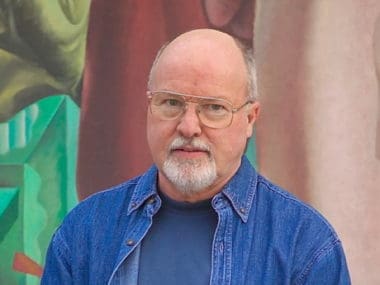Everything Belongs: The Gift of Contemplative Prayer
By Fr. Richard Rohr
Some time ago I received an email asking if writings and teachings of Fr. Richard Rohr were trustworthy (e.g. faithful to the teachings of the Church). Because I didn’t have the time to respond myself, I posted an article from a trusted writer that  reasonably addressed key issues. The article was written in a journalistic style that referenced the insights offered by others and was aimed at those who are already well-formed in their faith but unaware of whether or not Fr. Rohr was faithful to the teachings of Jesus and the Church.
reasonably addressed key issues. The article was written in a journalistic style that referenced the insights offered by others and was aimed at those who are already well-formed in their faith but unaware of whether or not Fr. Rohr was faithful to the teachings of Jesus and the Church.
Of course, those who were well-formed responded well to the piece. However, those who had less of a foundation and understanding of the Catholic faith and spirituality, and who were positively disposed to Fr. Rohr, found the article to be less helpful. In order to better serve this latter group, we have reviewed a popular book from Fr. Richard Rohr entitled Everything Belongs: The Gift of Contemplative Prayer. I am indebted to Tom Nash, (a former theological advisor for EWTN) for his assistance with this analysis.
Central to our review of Everything Belongs is Fr. Rohr’s perspective on the person and work of Christ. There are many aspects that are deeply problematic in this work. As the question of the nature of the person and work of Christ is central to the Christian faith, we thought it most helpful to focus on this aspect of Fr. Rohr’s writings.
In summary, Fr. Rohr’s writings reveal that he sees Jesus as an ideal guide of sorts, but he’s not truly Lord, neither for himself or for those Rohr teaches and counsels through his books, retreats and other spiritual direction.
In stark contrast to Fr. Rohr’s views, Jesus made clear in scripture that he came to save the world (John 3:16), and to this end, he founded and commissioned his Church to make disciples of all nations (Mt. 28:18-20). Jesus himself asserted that he is uniquely the way, the truth and the life (Jn. 14:6), that his truth would set us free (Jn. 8:31-32), that those who listened to his apostles and their successors listened to him, and that those who reject his apostles, rejected Jesus and his heavenly Father who sent him (Lk. 10:16).
Fr. Rohr’s Jesus is much more benign than Jesus in his self-revelation in scripture. For Rohr, Jesus merely gives “ideal eyes by which to see the real nature of reality” (emphasis added). “Real nature” is important because Rohr does not present Catholicism as it really is. Rather, from Rohr’s perspective, the gospel presented by Jesus is a non-demanding, non-threatening, ultimately optional way of life. On page 95 Fr. Rohr says:
The Gospel is not a competing idea. It’s that by which we see all ideas in proper context. We believe as Christians that Jesus gave us the ideal eyes by which to see the real nature of reality. He does not lead with his judgments (emphasis original).
Some might contend that Fr. Rohr is at least partially right. For example, Jesus did not lead with judgment against the woman at the well (John 4). But after introducing himself as the Messiah and showing the woman her worth, he called her to holiness, noting she had been married five times and was currently living with someone to whom she wasn’t married. Jesus, in that same conversation, also clearly judged and rejected the worship of her people noting that they didn’t know what they were doing and did not rightly recognize that salvation was “from the Jews.” Unfortunately, Fr. Rohr conveniently overlooks the hard words of Jesus here, on the Sermon on the Mount, and elsewhere. On page 107 Fr. Rohr flatly misrepresents the vast number of challenging statements of Jesus in scripture by stating:
…note that Jesus’ concept of “the Reign of God” is totally positive–not fear-based or against any individual, group, sin or problem (pg. 107; emphasis original).
This statement is not merely inaccurate or sloppy, it is so egregiously and obviously in contrast to the clear and repeated teaching of scripture that it seems to be a blatant attempt to misrepresent scripture for the sake of manufacturing a different Jesus than the one in scripture in order to fit Rohr’s message. Jesus constantly used contrast in pointing out true and false worship.
Even more fundamentally, Rohr falls into religious indifferentism regarding the basic mission of Christ and his Church. On page 93 he says (emphasis added):
I think Christianity has created a great problem in the Western world by repeatedly presenting itself, not as a way of seeing all things, but as one competing ideology among others. . . . Simone Weil, the brilliant French resistor [a woman who sadly declined to be baptized and become Catholic], said that “the tragedy of Christianity is that it came to see itself as replacing other religions instead of adding something to all of them.” I could not agree more.
Fr. Rohr provides very important insight into his spiritual outlook when he reveals that he believes in apokatastasis (also spelled apocatastasis), is a heresy known more in modern times as “universalism.” This heresy teaches that all the damned, whether men or women or fallen angels, will ultimately be restored and join God in heavenly glory for all eternity. This belief was made somewhat popular by the early Church Father Origen, who was misguided on a number of doctrinal matters and was eventually formally condemned.
Citing unnamed early Church Fathers (a common tactic in his writings that allows him to avoid scrutiny), Rohr describes this “universal restoration” as “the real meaning” of Christ’s Resurrection, which means that God’s love is “so perfect and so victorious that in fact it would finally win out in every single person’s life” (pg. 131). He erroneously claims that this view “gave rise to the mythology of purgatory” (pg. 131). Father adds incorrectly that apocatastasis is not a heresy:
When I read the history of the church and its dogma, I see apokatastasis was never condemned as heretical. We may believe it if we want to. We were never told we had to believe it, but neither was it condemned” (pg. 132, emphasis original).
It is true that some, like St. Gregory of Nyssa, espoused apocatastasis in the early Church when the Church had not formally pronounced definitively on the matter. But as the belief spread it was indeed formally condemned by the regional Council of Constantinople in 543, and its pronouncements were confirmed by Pope Vigilius. In addition, 10 years later in 553, the Second Council of Constantinople, an ecumenical or universal council, reaffirmed the condemnation of various heretics and “their sinful works,” including Origen, with no reversal on the recent condemnation of apocatastasis (canon 11). The absence of a reversal is indicative of an affirmation of the previous condemnation.
If apocatastasis were indeed true, the Church’s infallible and Jesus’ clear teachings in scripture on sin and the eternal punishment of hell, for example, would be rendered meaningless. In fact, after the condemnation of the regional council of Constantinople in 543, “The doctrine was thenceforth looked on as heterodox by the Church,” as The Catholic Encyclopedia, published in the early 1900s, affirmed.
 It is true, as Rohr says, that the Church has never pronounced that any particular person is in hell (pg. 132). But the Church has reaffirmed the existence of hell and its eternal punishments, most recently in Pope Paul VI’s Credo of the People of God (no. 12) and the Catechism of the Catholic Church (nos. 1033-37). Lest there be any doubt, the Catechism affirms, citing St. John Damascene, who lived from 676 to 749, “There is no repentance for the angels after their fall, just as there is no repentance for men after death” (no. 393). More importantly, Jesus himself affirmed in the Gospel of Matthew chapter seven that “many” choose the path to hell.
It is true, as Rohr says, that the Church has never pronounced that any particular person is in hell (pg. 132). But the Church has reaffirmed the existence of hell and its eternal punishments, most recently in Pope Paul VI’s Credo of the People of God (no. 12) and the Catechism of the Catholic Church (nos. 1033-37). Lest there be any doubt, the Catechism affirms, citing St. John Damascene, who lived from 676 to 749, “There is no repentance for the angels after their fall, just as there is no repentance for men after death” (no. 393). More importantly, Jesus himself affirmed in the Gospel of Matthew chapter seven that “many” choose the path to hell.
In light of his embrace of the heresy of apocatastasis, Fr. Rohr’s book title–Everything Belongs–makes more sense. In the end, there is no condemnation, only reconciliation and eternal communion with God: “For me, the utter powerlessness of God is that God forgives. . . . God seems to be so ready to surrender divine power” (pg. 153). Fr. Rohr’s God exhibits a distorted view of mercy and the absence of any real justice. Beyond the heretical nature of these assertions, mercy without justice is a meaningless idea. If we are all just fine and not in any need of redemption from our rejection of God (mortal sin) and the eternal consequences (hell), then Jesus turns into a confused guru rather than our Divine Redeemer as the Church teaches.
Consequently, for Fr. Rohr there is a tension between truth and love. Jesus says that his truth will set us free (Jn. 8:32), but Fr. Rohr says “the law does not give life; only the Spirit gives life, as Paul teaches in Romans and Galatians” (pg. 40). But Paul is speaking of the Old Covenant law, not the liberating New Covenant law of Jesus, and Fr. Rohr clearly ignores St. Paul’s hard pronouncements on mortal sin and damnation. “True religion is always about love. Love is the ultimate reality” (pg. 103), Rohr adds, whereas “a lot that’s called orthodoxy, loyalty and obedience is grounded in fear” (pg. 102). “The great commandment is not ‘thou shalt be right.’” He says. “The great commandment is to ‘be in love’” (pg. 88).
He is, of course, right that many who are orthodox don’t really understand the love and mercy of God and are motivated primarily out of fear and duty. However, heresy is not the answer to this problem, the authentic Gospel is.
For Rohr, a false notion of love trumps truth because God will win out in every person’s life, “God will turn all our human crucifixions into resurrection” (pg. 132). Here Rohr fails to see that hell is man’s “definitive self-exclusion from communion with God” (Catechism, no. 1033, emphasis added), and that true love entails not compelling one to have communion. God will not force us to accept heaven.
 In citing Acts 3:21 to defend universal restoration, Rohr fails to see that those who will not listen to the prophet will be destroyed (Acts 3:23). This is not to pronounce eternal judgment on non-Catholics and thus exclude invincible ignorance, but rather to affirm further that hell exists and that human beings can choose it. Choices do have consequences, some of them eternal. In that light, the Second Vatican Council Fathers teach in sober urgency regarding non-Catholics:
In citing Acts 3:21 to defend universal restoration, Rohr fails to see that those who will not listen to the prophet will be destroyed (Acts 3:23). This is not to pronounce eternal judgment on non-Catholics and thus exclude invincible ignorance, but rather to affirm further that hell exists and that human beings can choose it. Choices do have consequences, some of them eternal. In that light, the Second Vatican Council Fathers teach in sober urgency regarding non-Catholics:
But often men, deceived by the Evil One, have become vain in their reasonings and have exchanged the truth of God for a lie, serving the creature rather than the Creator. Or some there are who, living and dying in this world without God, are exposed to final despair. Wherefore to promote the glory of God and procure the salvation of all of these, and mindful of the command of the Lord, “Preach the Gospel to every creature,” the Church fosters the missions with care and attention (Lumen Gentium, no. 16, footnotes omitted).
In contrast, even though Jesus founded the Catholic Church (Mt. 16:18-19) and gave her the Great Commission to make disciples of all nations (Mt. 28:18-20), for Rohr the Church and her mission are not so important or urgent:
Institutional religion is a humanly necessary but also immature manifestation of this “hidden mystery” by which God is saving the world . . . . Institutional religion is never an end in itself, but merely a wondrous and “uncertain trumpet” of the message (pg. 180, emphasis original).
I personally do not believe that Jesus came to found a separate religion as much as he came to present a universal message of vulnerability and foundational unity that is necessary for all religions, the human soul, and history itself to survive. Thus Christians can rightly call him “the Savior of the world” (John 4:42), but no longer in the competitive and imperialistic way that they have usually presented him. By very definition, vulnerability and unity do not compete or dominate. In fact, they make competition and domination impossible. The cosmic Christ is no threat to anything but separateness, illusion, domination, and any imperial ego. In that sense, Jesus, the Christ, is the ultimate threat, but first of all Christians themselves. Only then will they have any universal and salvific message for the rest of the world (pp. 181-82, emphasis added).
Jesus Christ does indeed love all and thus died for all, but the true unity he preaches requires a choice to accept or reject him and his Church, as he first preached 2,000 years ago. If the words of Jesus himself, the words of the Apostles, and the teachings of the Church and the saints mean anything, the Christ that Rohr preaches is not the authentic Jesus. Rohr’s Jesus and his related proclamation of the Gospel is not the one that the Church has proclaimed and safeguarded for 2,000 years with the power of Holy Spirit. As a result, Rohr regrettably remains an unreliable and spiritually dangerous guide for souls, Catholic and non-Catholic alike.
If you want to deepen your relationship with the real Jesus, look to the Church and the spiritual doctors of the Church and the Holy Spirit will guide you through the wisdom of the ages to the authentic fountain of mercy, love, and union with Him.
+
Art: Richard Rohr, Svobodat, around 2004, PD-Worldwide self; A procession of Cardinals enters St. Peter’s in Rome, opening the Second Vatican Council, Franklin McMahon, 11 October 1962, CC-SA, both Wikimedia Commons. Catechism of the Catholic Church, file copy.
Editor’s Note: A listing of all our “Can I Trust” Posts can be found here: “Can I Trust” Series.




